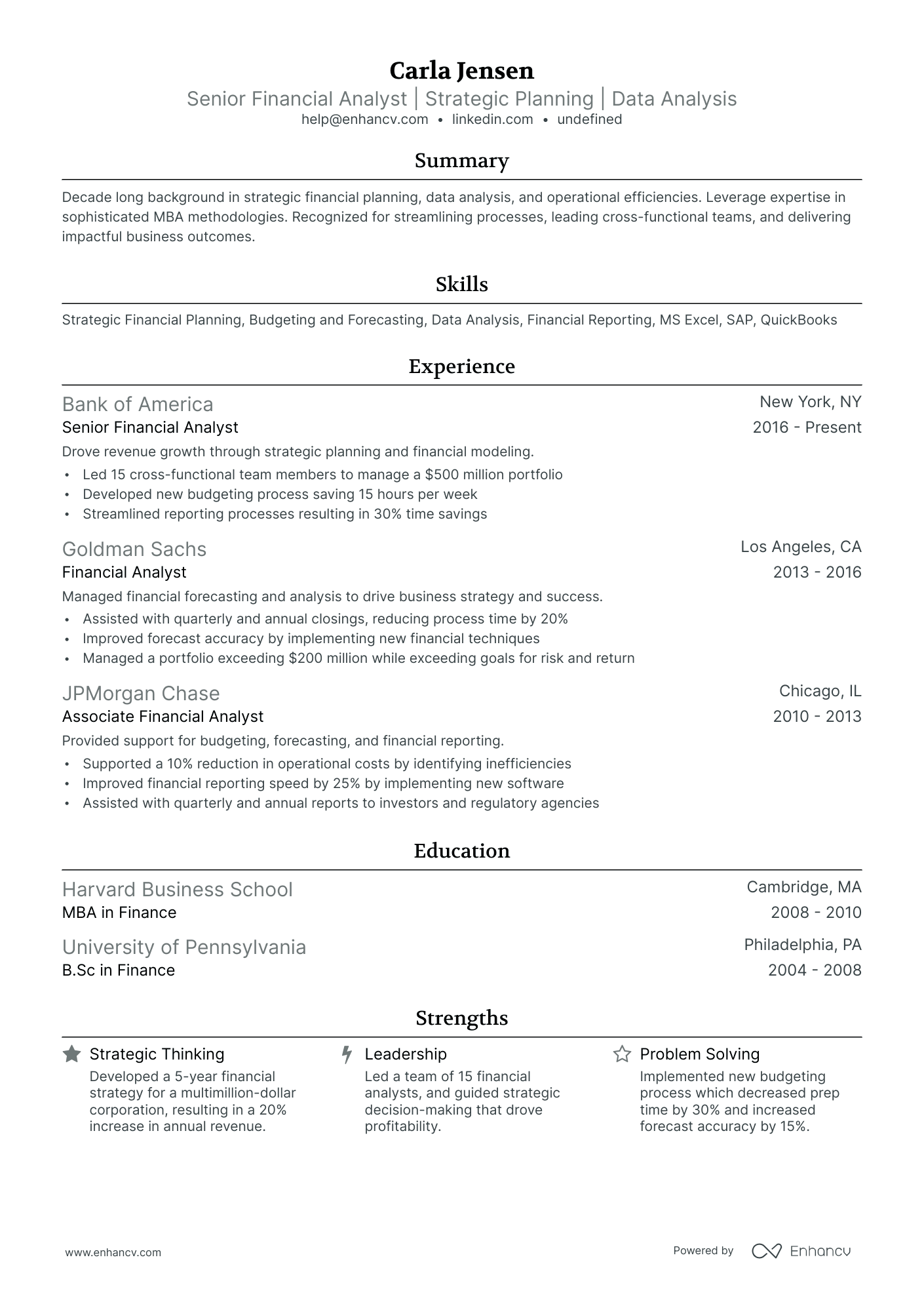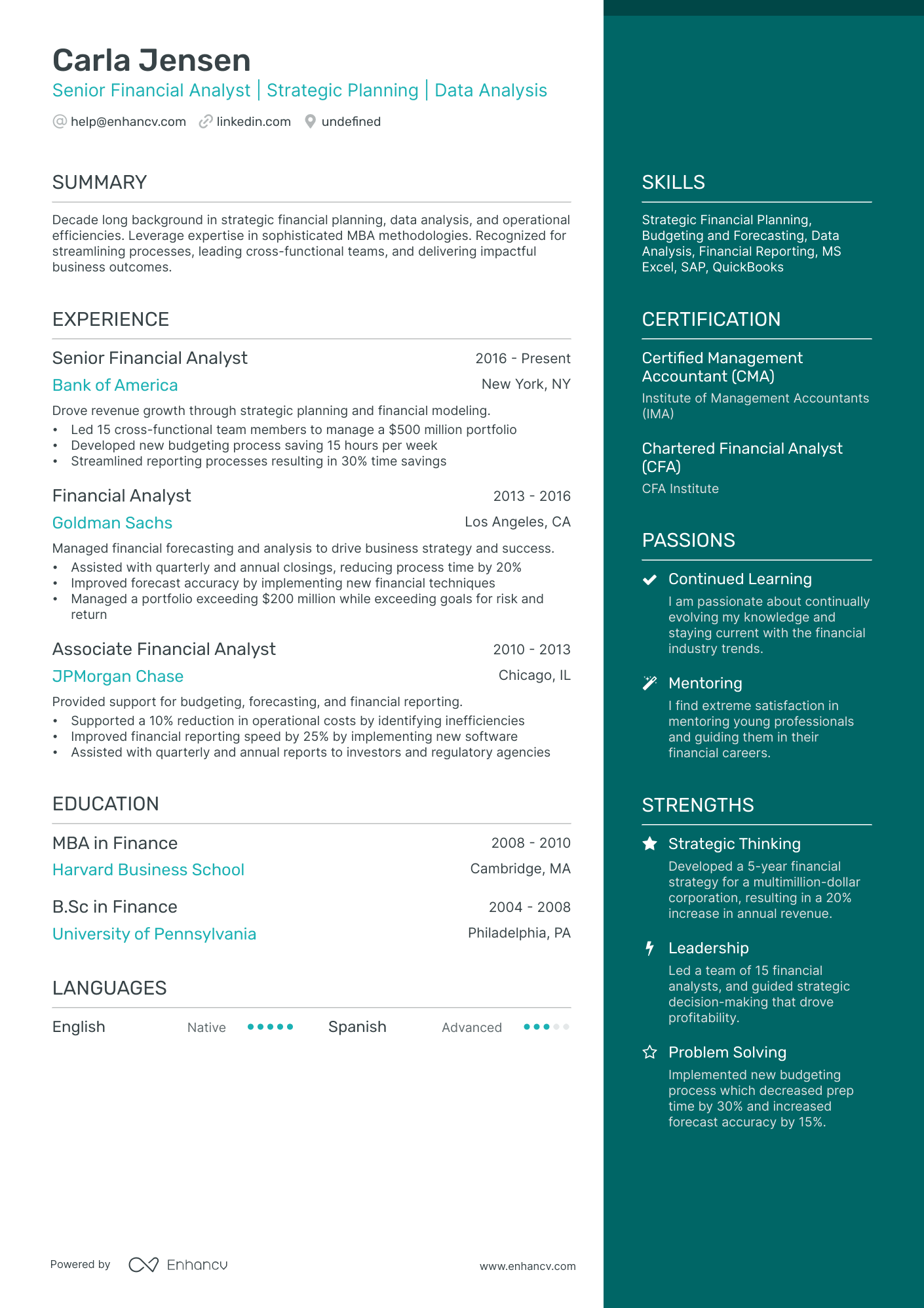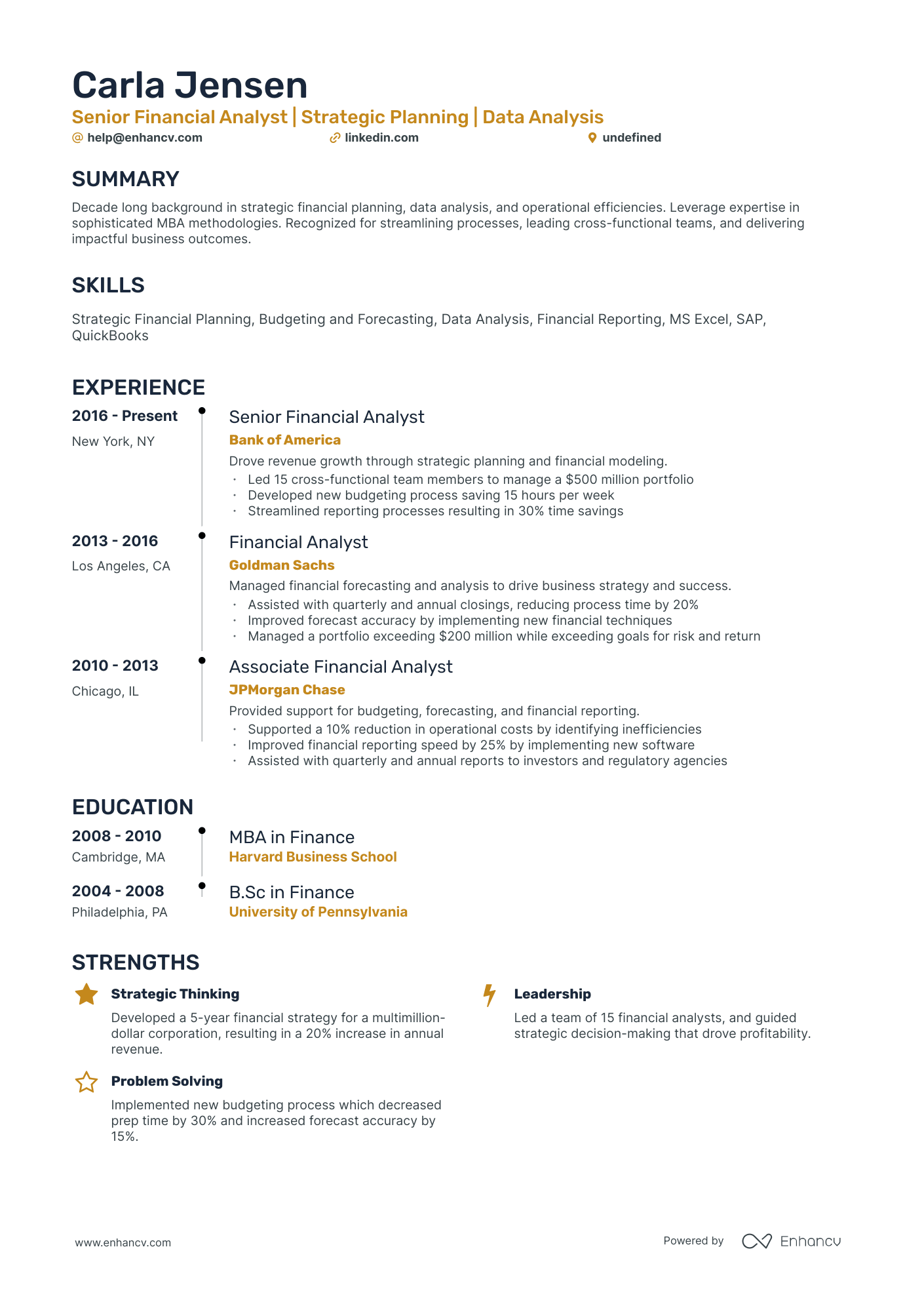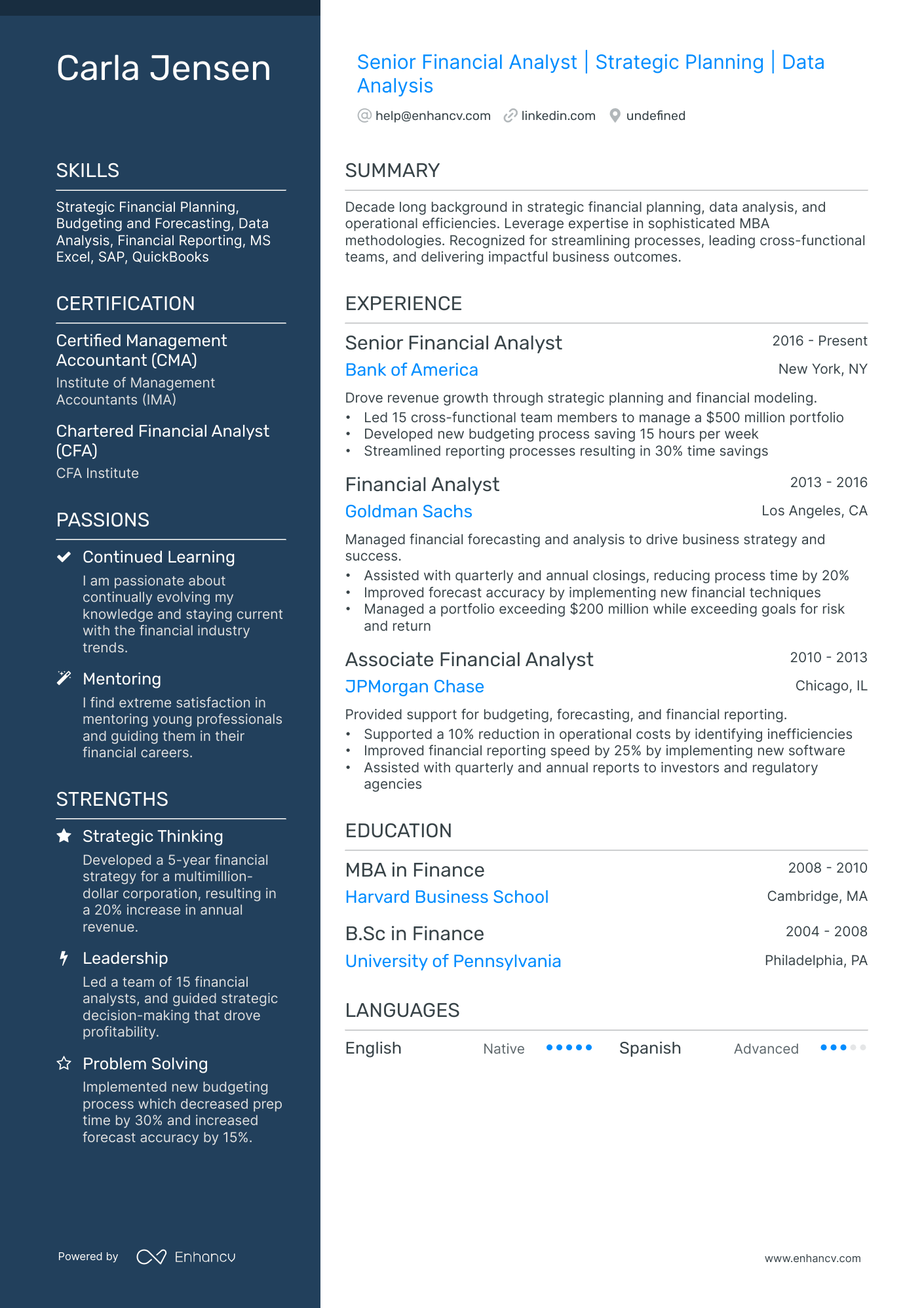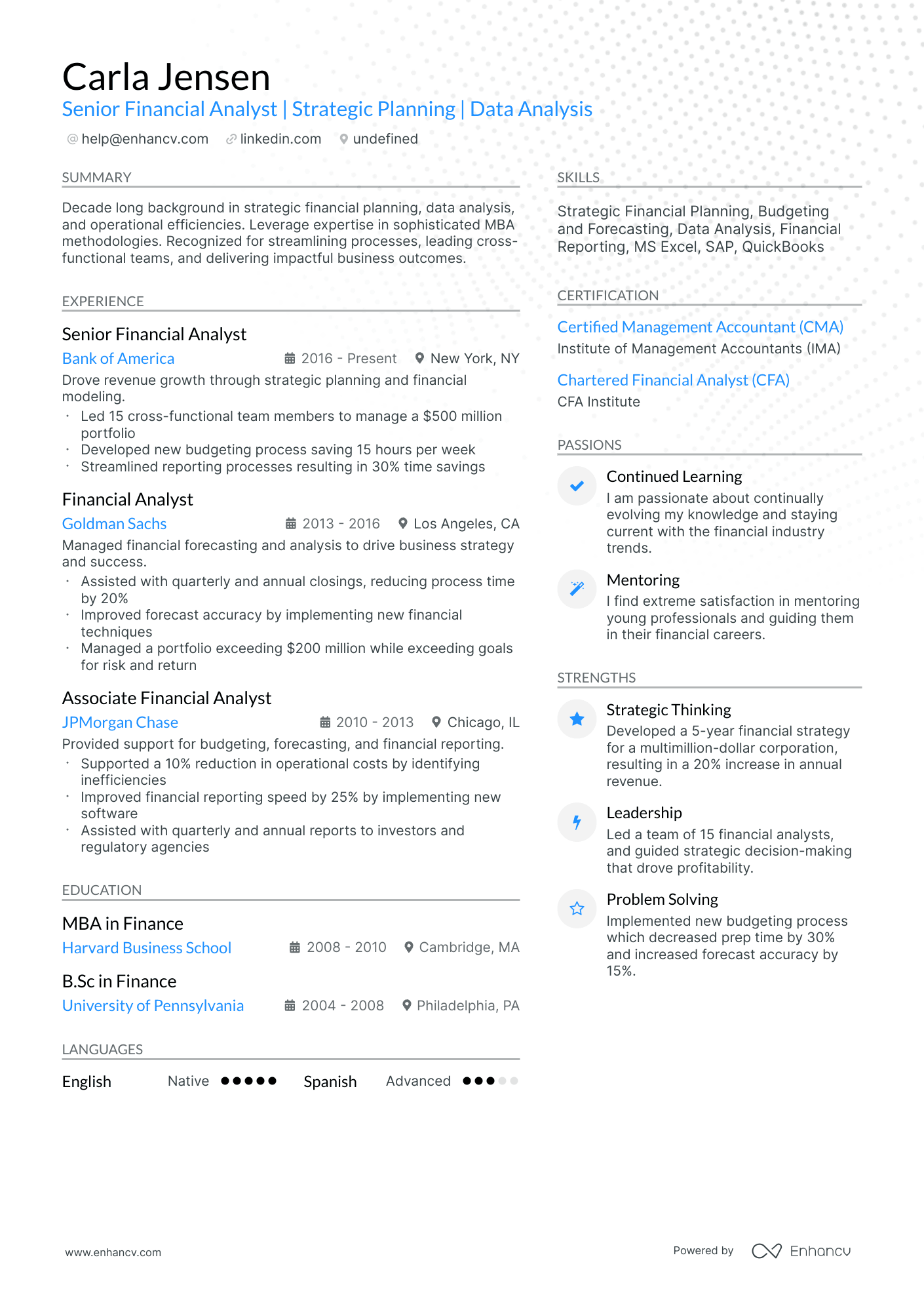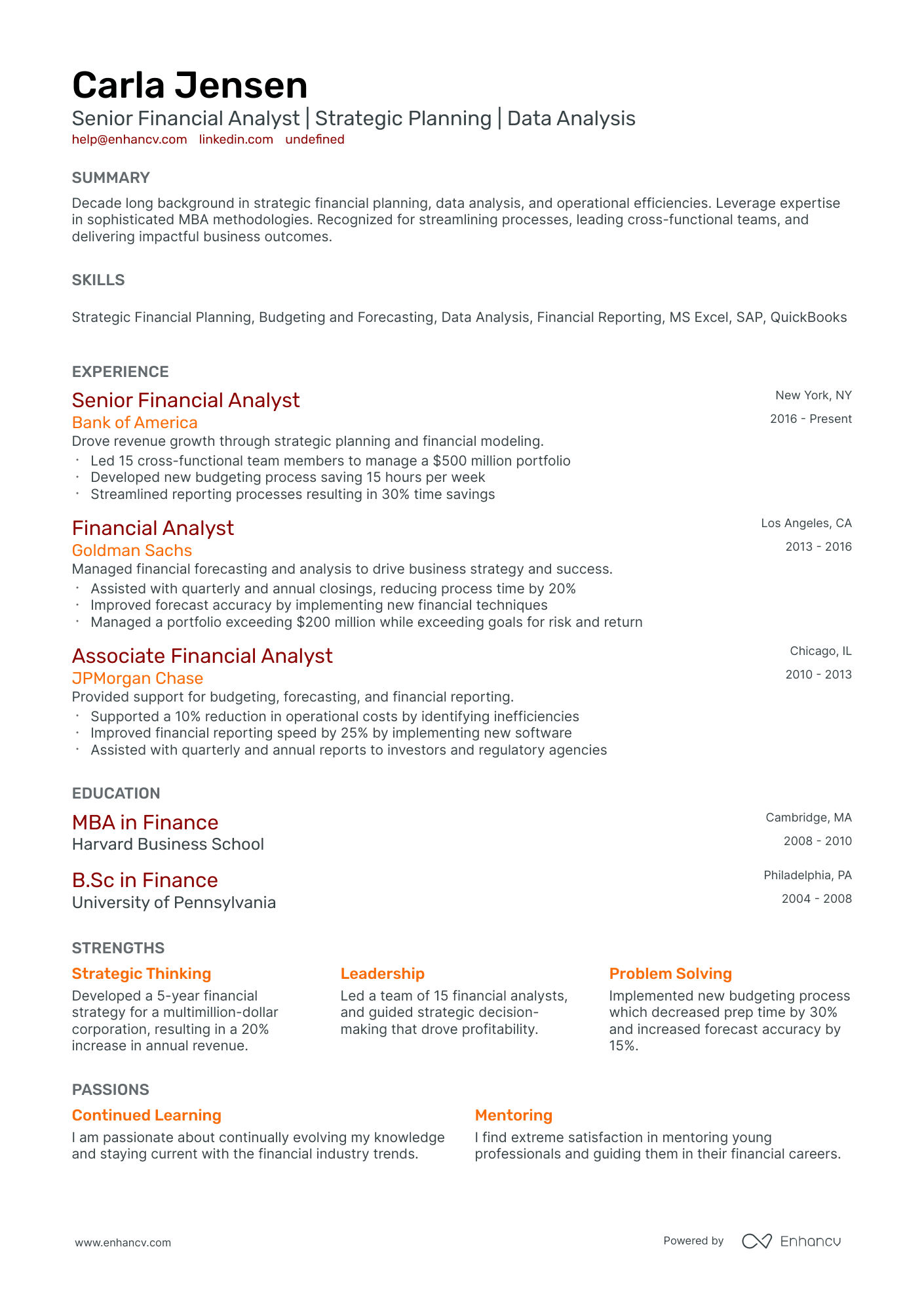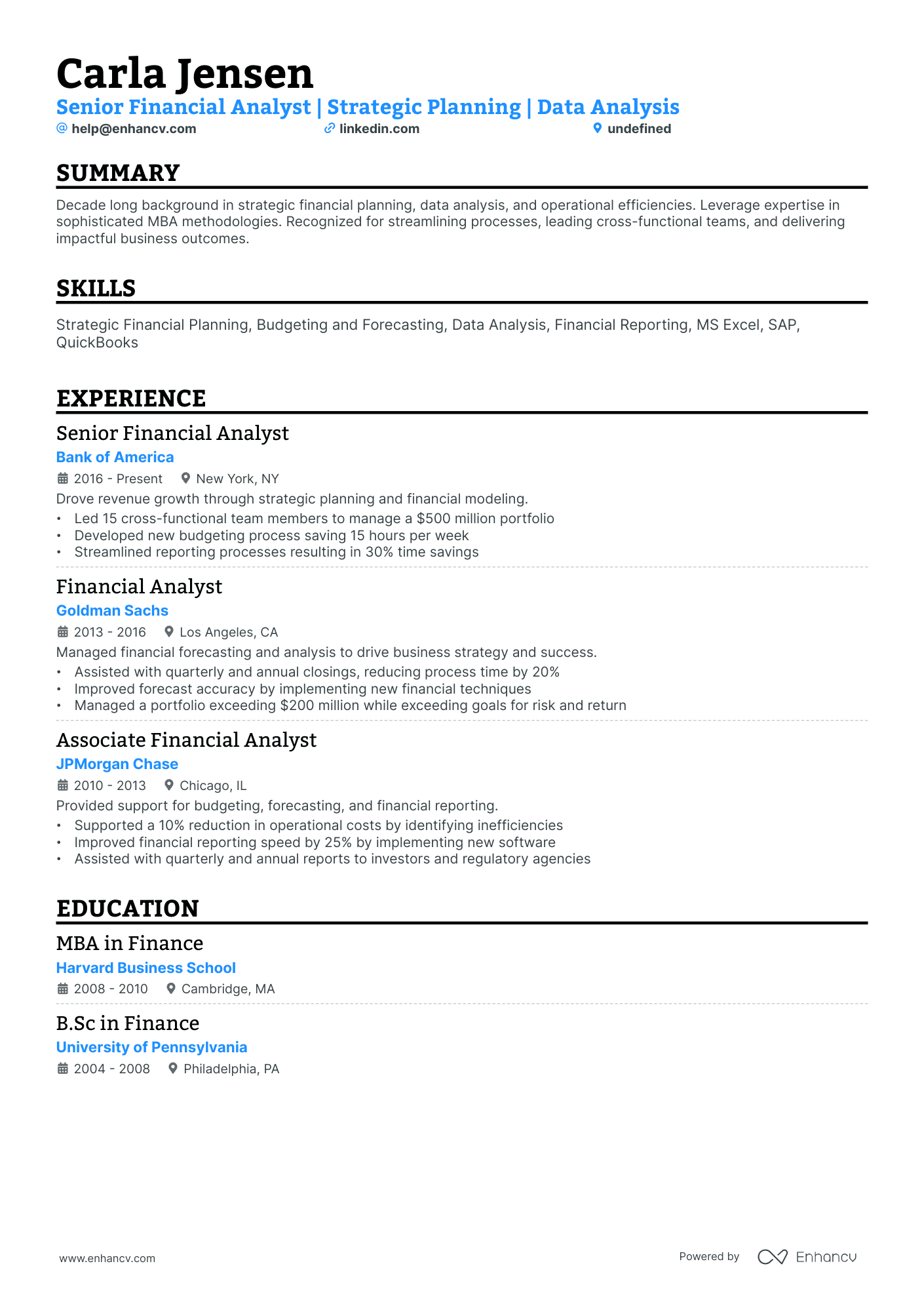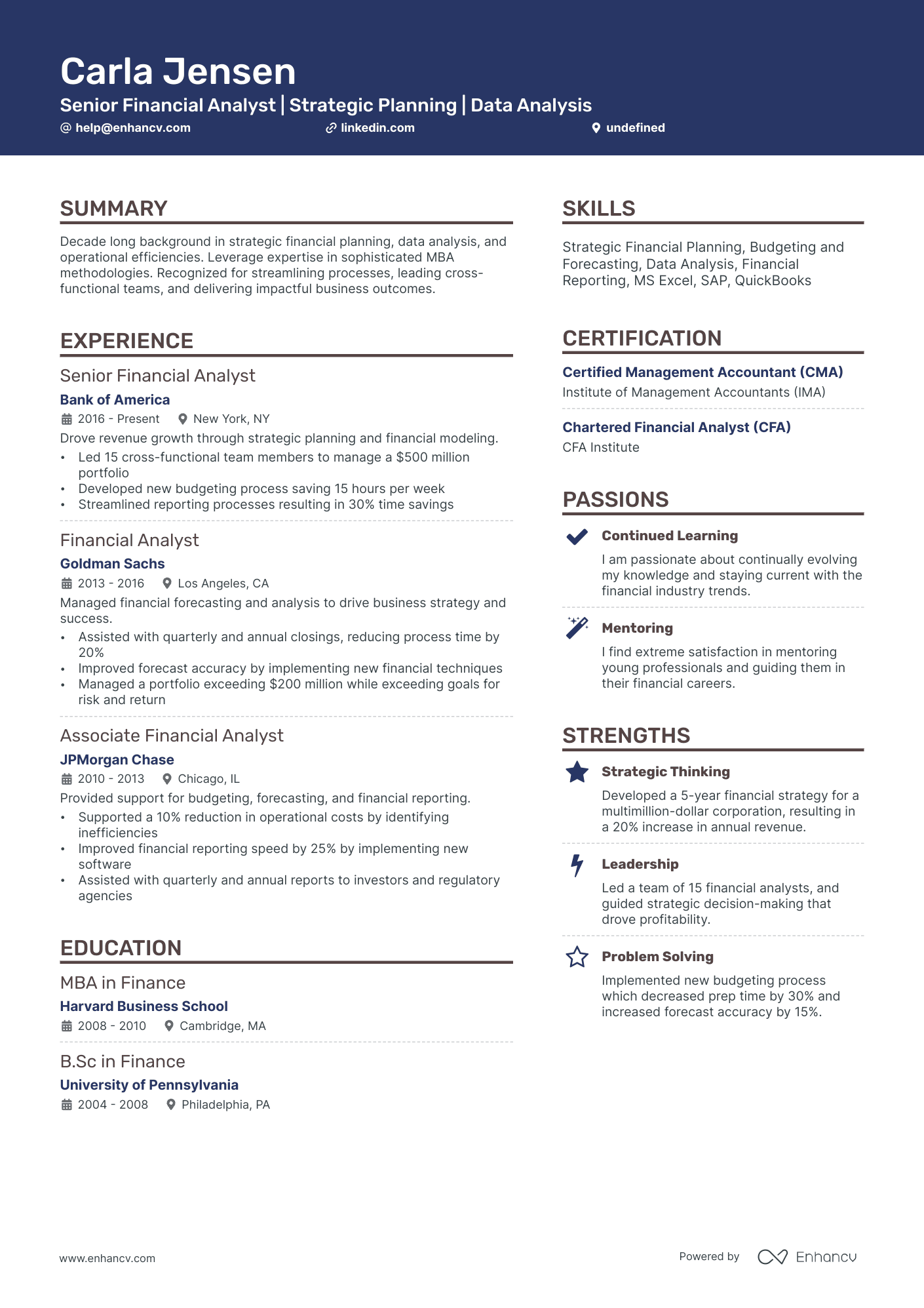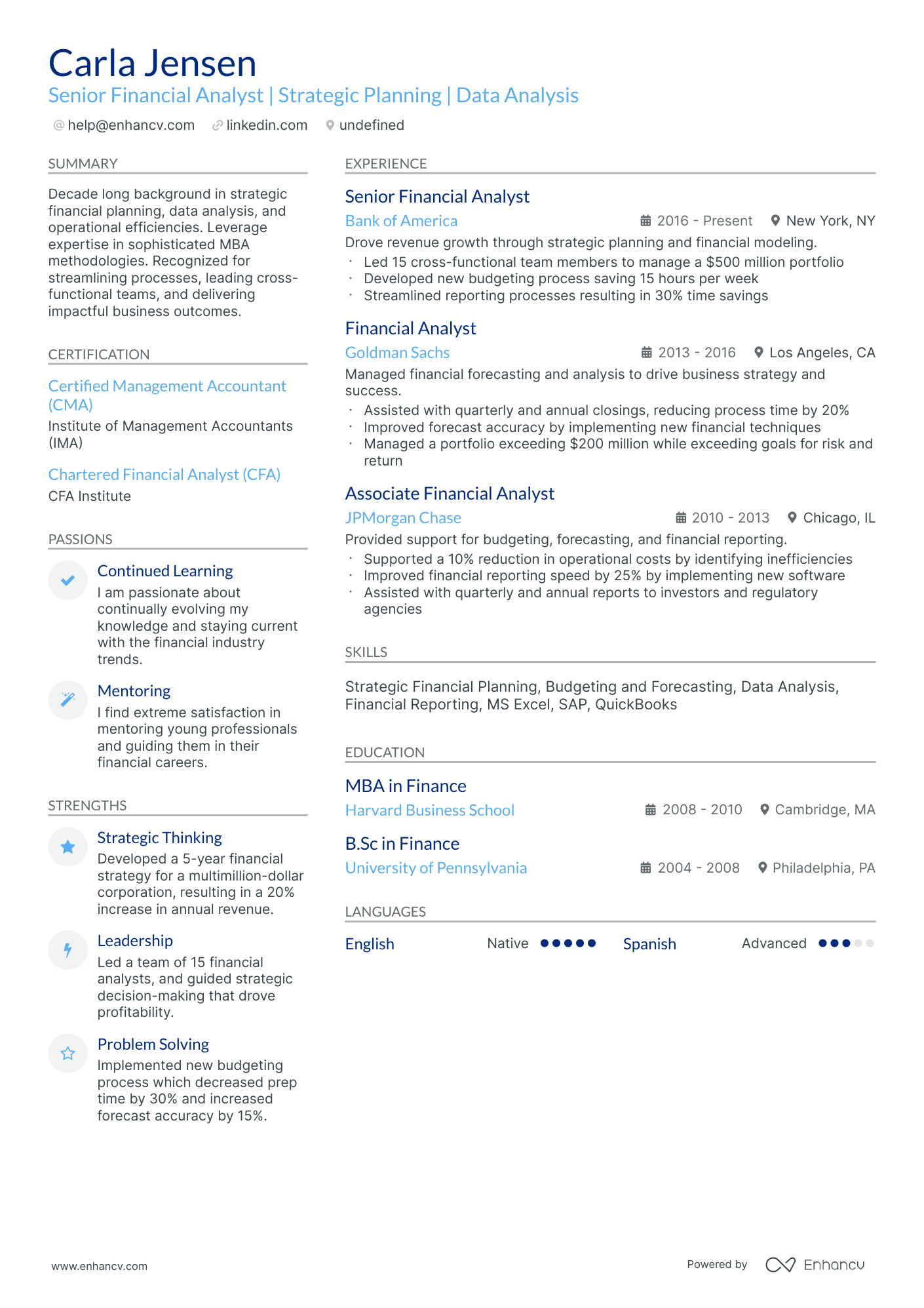One specific resume challenge faced by MBA applicants is effectively showcasing their diverse experiences and transferable skills from various sectors on a one-page document. Our guide can assist in addressing this issue by providing step-by-step instructions on how to succinctly yet powerfully capture relevant experiences, prioritize information based on relevance to the applied program, and highlight transferable skills that resonate with business schools.
Enhance your application for the MBA application role with our concise guide on how to:
- Format your MBA application resume, ensuring a balance between professionalism and creativity, in line with best practices.
- Align your resume with the MBA application job requirements by incorporating relevant industry keywords.
- Utilize distinct resume sections to highlight your skills and achievements, making a case for why you're the top pick for the MBA application role.
- Draw from leading MBA application resume examples to effectively tailor your experience.
Recommended reads:
Tips for refining your MBA application resume format
The resume format sets the stage for your professional narrative. Ensure it:
- Adopts the reverse-chronological format, placing your most recent experiences at the forefront. This format is ideal for those with relevant and up-to-date experience.
- Features a clear headline, making it straightforward for recruiters to access your contact details, portfolio, or current role.
- Stays concise, ideally spanning no more than two pages, focusing on relevant experiences and skills.
- Maintains its layout by being saved as a PDF, ensuring compatibility with Applicant Tracking Systems (ATS).
Upload your resume
Drop your resume here or choose a file. PDF & DOCX only. Max 2MB file size.
Pro tip
Your resume will likely be processed by an Applicant Tracking System (ATS). Ensure your header, summary, or objective incorporates essential skills required for the role.
The five (plus) definite sections your resume for a personal injury legal assistant job should include are:
- Header with your headline, contact details, and/or a preview of your work
- Summary (or objective) to pinpoint how your success aligns with the role
- Experience with bullets of your most relevant achievements in the field
- Skills to integrate vital job requirements (both technical and personal)
- Your further dedication to the field, showcased via relevant higher education and/or certifications
What recruiters want to see on your resume:
- Leadership Experience: Evidence of having led teams or projects, particularly those that had a significant impact on an organization.
- Quantifiable Achievements: Specifics about what you have accomplished at work or during your academic career, ideally expressed in numbers or percentages.
- Relevant Skills: Hard and soft skills relevant to the business world (like analytical thinking, project management, financial acumen) and demonstrated ability to apply them.
- Academic Excellence: High grades, particularly in courses related to business, as well as any other academic accolades.
- International Exposure: Experience working or studying in diverse cultural environments, demonstrating adaptability and global mindset.
Recommended reads:
The experience section of your MBA application resume: your professional journey
The experience section is your platform to narrate your professional story. Recruiters scrutinize this section to gauge your unique value proposition.
Here are five steps to craft a compelling experience section:
- Highlight relevant roles, including the company, role description, and tenure, supported by up to six bullet points per role.
- Emphasize tangible outcomes of your contributions, using quantifiable metrics where possible.
- Integrate positive feedback or endorsements to bolster your claims.
- Ensure verb tense consistency when detailing responsibilities.
- Summarize significant achievements relevant to each role.
Explore how seasoned MBA application professionals have crafted their experience sections to secure roles at industry-leading firms.
- Implemented data-driven marketing strategies resulting in a 20% increase in customer acquisition for a leading e-commerce company.
- Led cross-functional teams to successfully launch three new product lines, driving a revenue growth of $2 million annually.
- Developed and executed a comprehensive market research study, providing actionable insights that led to a 15% improvement in customer satisfaction.
- Optimized supply chain processes, reducing inventory costs by 25% and improving delivery reliability by 15%.
- Managed vendor relationships and negotiated contracts resulting in $500,000 in annual cost savings.
- Implemented a lean manufacturing system, increasing production efficiency by 30% and reducing waste by 20%.
- Led a team of sales representatives, achieving a 40% increase in regional sales within two years.
- Developed and executed a strategic business development plan, resulting in a 25% expansion of the customer base.
- Implemented CRM software and trained sales team members, improving customer relationship management and increasing customer retention by 15%.
- Managed a portfolio of high-net-worth clients, achieving an average annual return of 12% on investments.
- Developed and implemented customized financial plans, resulting in $2 million in new assets under management.
- Conducted market research and analyzed investment opportunities for clients, resulting in a 15% increase in portfolio diversification.
- Led a team of software engineers in developing and launching a mobile app that reached 1 million downloads within six months.
- Managed agile development processes, delivering high-quality software products on time and within budget.
- Collaborated with product managers and designers to create user-friendly interfaces and improved user experience, resulting in a 20% increase in app engagement.
- Implemented digital marketing campaigns using SEO and SEM strategies, resulting in a 30% increase in website traffic.
- Developed and executed social media marketing campaigns that generated $500,000 in revenue within one year.
- Utilized data analytics to optimize online advertising campaigns, achieving a 20% lower cost per acquisition.
- Managed a team of engineers in the design and development of innovative software solutions for clients.
- Led the successful implementation of a cloud-based enterprise resource planning (ERP) system, improving operational efficiency by 25%.
- Collaborated with cross-functional teams to deliver complex projects, consistently meeting deadlines and exceeding client expectations.
- Led the product management team in launching a new SaaS platform, resulting in a 50% increase in user adoption.
- Conducted market analysis and competitor research to identify market trends and opportunities for product expansion.
- Collaborated with engineering teams to prioritize product features and enhancements, resulting in a 20% decrease in customer churn rate.
- Developed and executed strategic marketing campaigns for global brands, resulting in a 15% increase in brand awareness.
- Managed cross-functional teams to deliver integrated marketing campaigns across multiple channels.
- Analyzed market data and consumer insights to drive product positioning and messaging strategies.
- Implemented process improvements and automation initiatives, reducing operational costs by 20%.
- Managed a team of business analysts in analyzing market trends and developing pricing strategies.
- Collaborated with executive leadership to develop and execute a growth strategy resulting in a 30% increase in revenue.
Quantifying impact on your resume
<ul>
Strategies for candidates with limited or no experience
Even if you're light on experience, other facets of your MBA application resume can resonate with job requirements:
- Education: Detail skills acquired that dovetail with job expectations.
- Internships & Temporary Roles: Spotlight roles that underscore your relevant expertise.
- Skills: Address both foundational and nuanced job qualifications.
- Strengths & Achievements: Illuminate the distinct value you bring, even if you're newer to the industry.
Recommended reads:
Pro tip
Your experience section should be a testament to your professional growth. If your career journey isn't particularly linear or impressive, focus on detailing specific skills and the tangible outcomes of your responsibilities.
Essential MBA application hard and soft skills for your resume
Recruiters evaluate not just your professional history, but also how your skills resonate with the job's requirements.
Your skills are categorized into:
- Hard or technical skills: These reflect your proficiency in specific tasks or technologies.
- Soft skills: These pertain to your interpersonal abilities and how you adapt to various situations.
When crafting your resume, ensure you:
- Highlight five to six skills that directly align with the job description.
- Integrate industry-specific keywords while also emphasizing your unique strengths.
- Support your skills with an achievements section, detailing tangible outcomes.
- Quantify your proficiency wherever possible, rather than merely listing skills.
To help you, we've curated a list of the most sought-after hard and soft skills for MBA application roles.
Top skills for your MBA application resume:
Data Analysis
Financial Modeling
Market Research Tools
CRM Software (e.g., Salesforce)
Microsoft Excel
Project Management Software (e.g., Asana)
Statistical Analysis Software (e.g., SPSS)
Presentation Software (e.g., PowerPoint)
Business Intelligence Tools (e.g., Tableau)
Database Management (e.g., SQL)
Leadership
Communication
Critical Thinking
Team Collaboration
Problem-Solving
Time Management
Adaptability
Networking
Negotiation
Decision Making
Pro tip
Consider dedicating a separate skills section on your MBA application resume to showcase your technical proficiencies, especially if you want to highlight specific software expertise.
Choosing the right certifications and education for your MBA application resume
Your education section can highlight skills and experiences perfect for the job.
- List college or university degrees with the school name and dates.
- If you're still studying, mention your expected graduation date.
- Think twice before adding unrelated degrees. Space on your resume is precious.
- Discuss educational achievements if they boost your job relevance.
There are many certifications out there. Which ones should you include?
- List your main degree in a separate section with the school name and dates.
- Only add certifications that highlight your skills and experience.
- Place unique or recent certifications near the top.
- Add a brief description to certifications if it helps show your skills.
Remember, it's not about quantity but relevance.
Best certifications to list on your resume
- EFMD Programme Accreditation System (EPAS) - EFMD Global
- Chartered Financial Analyst (CFA) - CFA Institute
- Supply Chain Operations Reference (SCOR-P) - APICS
- Certified Information Security Manager (CISM) - ISACA
Pro tip
If a particular certification is highly valued in the industry or by the company, consider highlighting it in your resume's headline.
Recommended reads:
Should you add a summary or objective to your MBA application resume?
Choose between:
- Resume summary to match job needs with your top wins.
- Resume objective to share your career goals.
Both should tell recruiters about your best moments. Keep them short, around five sentences. Check out our sample structures for guidance.
Resume summary and objective examples for a MBA application resume
Additional sections to amplify your MBA application resume
To further personalize your resume and showcase a broader spectrum of your professional journey, consider adding:
- Projects that highlight your hands-on experience.
- Awards that recognize your industry contributions.
- Volunteer work that underscores your community involvement and soft skills.
- Hobbies that offer a glimpse into your personality and passions.
Key takeaways
- Format your MBA application resume for clarity and coherence, ensuring it aligns with the role.
- Highlight key sections (header, summary/objective, experience, skills, certifications) within your MBA application resume.
- Quantify achievements and align them with skills and job requirements.
- Feature both technical and personal skills across your resume for a balanced portrayal.
